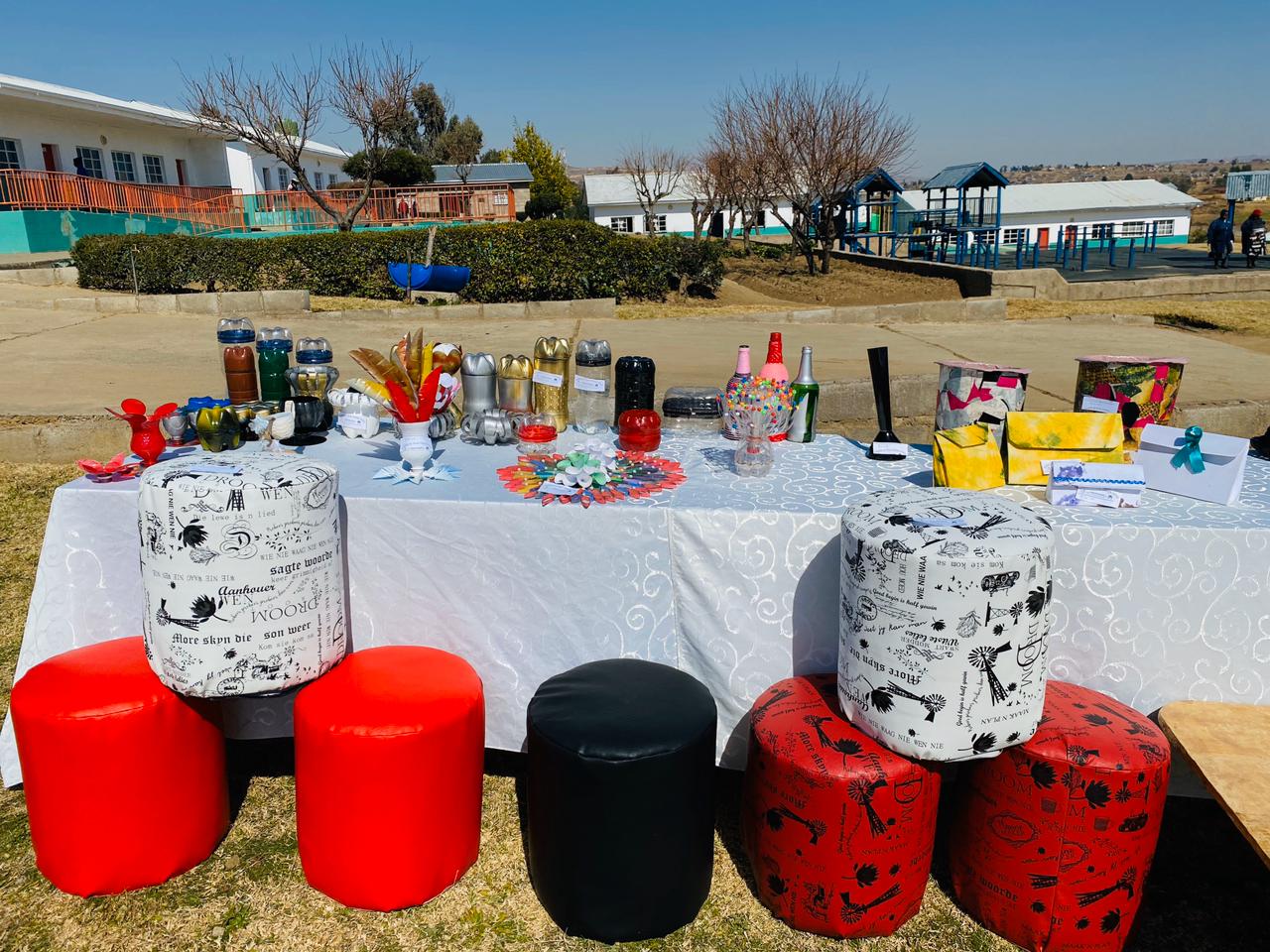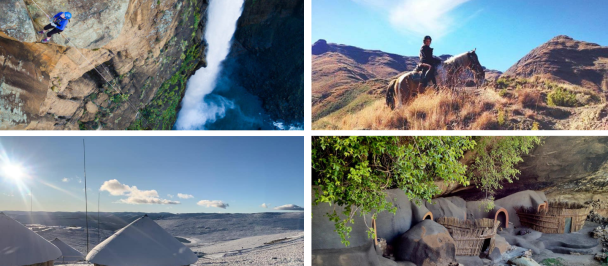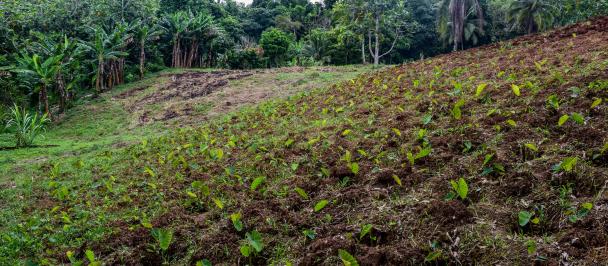Exploring Innovation Diffusion Platforms for Experiments’ Scaling within the UN and Government’s Development Work
February 10, 2023
The UN Lesotho Team with Kantakanta Group Members in Maputsoe
While the advent of Accelerator Labs model within UNDP has brought new thinking and dynamic ways to traverse and achieve development goals, questions remain about the value and influence of experiments on complex and large-scale challenges requiring large amounts of resources which are not at the Labs’ disposal. This notion may have different connotations, and the negative aspect is, others may perceive Accelerator Lab’s work as insignificant in some instances, because experiments do not inherit a scaling guarantee in design when compared to conventional means of implementation including projects or portfolio implementation in programming. The Lesotho Accelerator Lab thinks purposively exploring implementation models such as the diffusion of innovation theory may ease scaling and advance development impact of these experiments.
Since 2019, at least 40% of the Lesotho Accelerator Lab’s experiments were successfully ‘adopted’ by the government. These have been mainly on data and digital transformation solutions responding to access and efficiency gaps within the public service which were exacerbated by the emergence of COVID-19. Notwithstanding the size of the projects, these experiments have leveraged opportunities for digital adoption in government, stimulated digital transformation and inclusion in various aspects of community health, community governance and peace building, agricultural value chains and support to Micro, Small and Medium Enterprises (MSMEs) identification in Lesotho. These catalytic interventions were able to mobilize resources and leverage partnerships with the private sector and academia, building a triangular partnership equilibrium, thus ensuring sustainability of experiments even beyond the experimental period.
Lessons learned over the past three years indicate that different strategies to adapt to emerging development dynamics are currently required to scale experiments, improve adoption rate and partnerships, particularly within the UN system in Lesotho and other development actors.
One dimension which the Lab has explored and will continue to exhaust for purposes of diffusion of innovations is to utilize opportunistic platforms created by the UN Resident Coordinator’s office in Lesotho. Recently, the Lesotho Accelerator Lab was afforded an opportunity to host the UN Country and Programme Teams in one of its community experiments sites through Joint Site Visits by United Nations Country Team (UNCT). Primarily, the purpose of UN Lesotho platform is to obtain firsthand experience with beneficiaries and observe the impact of the UN’s interventions at community level. These coordinated efforts ensure that UN in Lesotho does not duplicate efforts in all thematic areas of UN’s mandate, but it also provides the opportunity for visibility on ongoing work while also identifying synergistic programming attributes to assist and enforce unity to deliver as one.
Thuso-Etla-Tsoa-Kae Student Demonstration on Manufacturing a Plastic Waste Stool
For purposes of experiments site tour, the Lab identified Maputsoe and Butha-Buthe urban councils where different sets of innovations under the Plastics Initiative were implemented under two different thematic areas. The first one is the environmental governance model in communities, partnering with Kantakanta Group, which is a community-based organization in Maputsoe. The organization is mandated to undertake developmental initiatives in health and environment in urban communities to enhance people’s livelihoods. The second thematic area was on circular economy and inclusion within creative arts to enhance skills capacity for people with disabilities. In this area we partnered with Thuso-Etla-Tsoa-Kae School for children with disabilities and Pretty-Waste Company in Butha-Buthe.
To promote ownership of work and sustainability, the Lab accorded beneficiaries to execute their own arrangements to accommodate visiting UN and Government stakeholders. All presentations were facilitated by the beneficiaries, mapping their journey and experiences through ideation to implementation, results and articulation of possible scaling and sustainability plans. This enabled participating stakeholders to follow and immediately identify synergic entry points within their different ongoing and planned activities within major projects. The excursion created a compendium of curated solutions ready to be adopted and scaled with learning outcomes and available support from the Lab and beneficiaries.
Important to note, the majority of observed intriguing solutions on site visits are being considered by sister UN agencies for diffusion into their projects. The compendium includes waste traps (lock fences) at various drainage outlets within Maputsoe urban council to trap waste entering local dams. These dams are the main sources of local water supply and fishing activities in the area, and a simple local solution such as the waste traps not only contributes to cleaner water bodies by protecting life in water (SDG6, SDG14), but also indirectly improving fishing livelihood and protein intake in local community that is facing many challenges of health and unemployment among youth and women that has manifested broadly across the country (SDG1, SDG2, SDG3, SDG8).
Waste-trap (lock-fence) installed on a water channel leading to the dam in Maputsoe
The plastics recycling and repurposing is also considered a possible income generating activity for returning migrant labourers by the International Organization for Migration (IOM). Both the World Health Organization (WHO) and the United Nations Population Fund (UNFPA) have seen opportunities, leveraging on the existing community groups that have face-to-face interactions with community members, to disseminate health and safety messaging to bring an added perspective and value upon ongoing community action within the health sector.
The purpose of this piece is to show that scaling is not only about mobilizing more resources to expand the initiative, or expansion into more localities while adopting experiments’ outputs. It is also about bringing a more integrated approach to programming to share experience on experiments’ artefacts. The approach has possibilities of unlocking an integrated approach to the experimentation process which can provide an offer of knowledge-base and tested solutions to communities, government, and development partners with ease of uptake and consumption to achieve higher magnitudes of growth and sustainability.
Kraemer & Xu accentuate the importance of individuals being exposed to live scenarios on the innovative initiative to help become more competent through learning from the experience acquired to sensitize intention, traversing further to adoption and scaling. In this case, the Lesotho Accelerator Lab had beneficiaries telling their success stories including ownership and sustainability plans to assure smooth integration and full-scale deployment of innovations of interest for possible adopters.

Pretty Waste and Thuso-Etla-Tsoa-Kae Products Manufactured by Students for Circular Economy
It is worth noting that the Lesotho Accelerator Lab did not anticipate that a day trip around two urban councils would differ from any normal site visit which stakeholders have been exposed to. However, the expedition had monumental moments highlighting solutions addressing real issues on the ground. This did not only yield applauses and courtesy treatment offered to the UN Agencies and Government stakeholders, but the immediate open evaluation on activities coupled with a voluntary scaling and adoption plans for innovations within identifiable ongoing and planned projects.
This has inspired the Lesotho Accelerator Lab to include sharing real-life experiences more rather than the knowledge artifacts where possible, to sensitize possibilities of innovation adoption within the local context. The Lab intends to work with the UN system and other development actors, to explore avenues for diffusing innovation, to persuade, influence decisions and adoption of experiments within wider development initiatives in Lesotho and beyond.

 Locations
Locations


